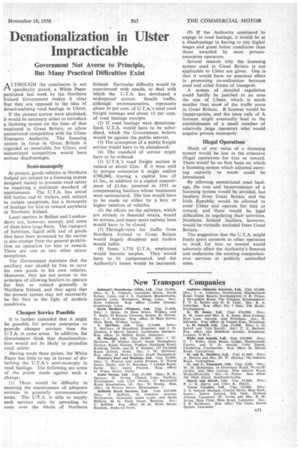Denationalization in Uhter Impracticable
Page 65

If you've noticed an error in this article please click here to report it so we can fix it.
Government Not Averse to Principle, But Many Practical Difficulties Exist
ALTHOUGH the conclusion is not I-1 specifically stated, a White Paper published last week by the Northern Ireland Government makes it clear that they are opposed to the idea of denationalizing road haulage in Ulster.
If the present system were abolished, it would be necessary either to introduce a licensing system on the lines of that employed in Great Britain, or allow unrestricted competition with the Ulster Transport Authority. The licensing system in force in Great Britain is regarded as unsuitable for Ulster, and unrestricted competition would have serious disadvantages Semi-monopoly
At present, goods vehicles in Northern Ireland are subject to a licensing system designed mainly to promote road safety by requiring a minimum standard of maintenance. The U.T.A. has about 650 lorries and 61 trailers, and, subject to certain exceptions, has a monopoly of haulage for hire or reward anywhere in Northern Ireland.
Local carriers in Belfast andLondonderry -are, however, exempt, and some of them have large fleets. The transport of furniture, liquid milk and of goods that have been processed by the carrier is also exempt from the general prohibition on operation for hire or reward. There are one or two other minor exceptions.
The Government maintain that the ancillary user should be free to carry his own goods in his own vehicles. Moreover, they are not averse to the principle of allowing hauliers to operate for hire or reward generally in Northern Ireland, and they agree that the present system may not necessarily be the best in the -light of modern conditions.
Cheaper Service Possible It is further conceded that it might be possible for private enterprise to provide cheaper, services than the U.T.A. in some areas. In addition, the Government think that denationalization would not be likely to prejudice road safety.
Having made these points, the White Paper has little to say in favour of disturbing the U.T.A.'s semi-monoply in road haulage. The following are some of the points made against such a change: (1) There would be difficulty in ensuring the maintenance of adequate services in generally unremunerative areas. The U.T.A. is able to supply such services only by spreading its costs over the whole of Northern Ireland. Particular difficulty would be experienced with smalls, to deal with which the U.T.A. has developed a widespread system. Smalls traffic, although unremunerative, represents about 16 per cent. of U.T.A.'s total road freight tonnage and about 13 per cent. of road haulage receipts.
(2) If road haulage were denationalized, U.T.A. would have to be subsidized, which the Government believe would be against the public interest.
(3) The conception of a public freight service would have to be abandoned:
(4) The standard of service might have to be reduced.
(5) U.T.A.'s road freight section is valued at about £2m. If it were sold to private enterprise it might realize £700,006, leaving a capital loss of £1.3m., in addition to a capital commitment of £1.6m. incurred in 1935 in compensating hauliers whose businesses were nationalized. The loss would have to be made up either by a levy or higher taxation of vehicles.
0) the effects on the railways, which are already in financial straits, would be serious, and many more railway lines would have to be closed.
(7) Through-rates for traffic from Northern Ireland to Great Britain would largely disappear and traders would suffer.
(8) Some 1,770 U.T.A. employees would become surplus. They would have to be compensated, and the Authority's losses would be increased.
(9) If the Authority continued to engage in road haulage, it would be at a disadvantage in having to pay higher wages and grant better conditions than those awarded by most privateenterprise operators.
Several reasons why the licensing system used in Great Britain is not applicable to Ulster are given. One is that it would have no practical effect in promoting co-ordination between road and other forms of transport.
A system of detailed regulation could hardly be justified in an area the size of Ulster, which is much smaller than most of the traffic areas in Great Britain. B licences would be inappropriate, and the issue only of A licences might eventually lead to the establishment of a small number of relatively large operators who would acquire private monopoly.
Illegal Operations
Much of any value of a licensing system would be lost in the extensive illegal operations for hire or reward. There would be no firm basis on which a licensing system which adjusted carrying capacity to needs could be introduced.
By allowing unrestricted road haulage, the cost and inconvenience of a licensing system would he avoided, but hauliers from Great Britain and the Irish Republic would be allowed to enter Ulster and operate for hire or reward, and there would be legal difficulties in regulating their activities. Northern Ireland hauliers, however, would be virtually excluded from Great Britain.
The suggestion that the U.T.A. might freely grant consents to other operators to work for hire or reward would adversely affect the Authority's finances and undermine the existing comprehensive services at publicly controlled rates.




















































































































